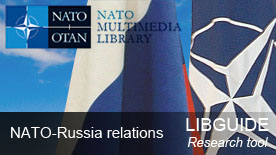Following Russia’s disproportionate military action in Georgia in early August 2008, the Alliance suspended formal meetings of the NRC and cooperation in some areas, while it considered the implications of Russia’s actions for the NATO-Russia relationship. Cooperation continued in key areas of common interest, such as counter-narcotics and the fight against terrorism. A decision to resume formal meetings and practical cooperation was taken in March 2009.
The NRC was established at the NATO-Russia Summit in Rome on 28 May 2002 by the Declaration on “NATO-Russia Relations: a New Quality”. The Rome Declaration builds on the goals and principles of the 1997 NATO-Russia Founding Act on Mutual Relations, Cooperation and Security, which remains the formal basis for NATO-Russia relations.
The purpose of the NRC is to serve as the principal structure and venue for advancing the relationship between NATO and Russia. Operating on basis of consensus, it seeks to promote continuous political dialogue on security issues with a view to the early identification of emerging problems, the determination of common approaches, the development of practical cooperation and the conduct of joint operations, as appropriate.
Work under the NATO-Russia Council focuses on all areas of mutual interest identified in the Founding Act. New areas may be added to the NRC’s agenda by the mutual consent of its members.
The NRC replaced the Permanent Joint Council (PJC), a forum for consultation and cooperation created by the 1997 NATO-Russia Founding Act. Under the NRC, Russia and NATO member states meet as equals “at 29” – instead of in the bilateral “NATO+1” format under the PJC.
Participants
The 28 NATO member states and Russia participate in the NRC. Meetings of the NRC are chaired by NATO's Secretary General.
The NRC usually meets monthly at the level of ambassadors and military representatives; twice yearly at the level of foreign and defence ministers and chiefs of staff; and occasionally at summit level.
The members of the NRC, acting in their national capacities and in a manner consistent with their respective collective commitments and obligations, take joint decisions and bear equal responsibility, individually and jointly for their implementation.
The work of the NRC
Since its establishment, the NRC has evolved into a productive mechanism for consultation, consensus-building, cooperation, joint decision and joint action.
Under the NRC, a number of working groups and committees have been established to develop cooperation on terrorism, proliferation, peacekeeping, theatre missile defence, airspace management, civil emergencies, defence reform, logistics, and scientific cooperation focused on new threats and challenges. Experts have been tasked to take work forward on individual projects in other key areas.
An important innovation under the NRC is the Preparatory Committee, which meets at least twice a month to prepare ambassadorial discussions and to oversee all experts’ activities under the auspices of the NRC.
A stocktaking of the NRC’s activities was undertaken in spring 2006. NRC member countries looked at the progress achieved and challenges identified in the course of implementing the NRC’s agenda. On this basis, Allied and Russian foreign ministers meeting in Sofia in April 2006 agreed a set of priorities and recommendations to guide the NRC’s work in the medium term.
Overarching priorities include reinforcing political dialogue; strengthening cooperation in the areas of interoperability, defence reform, the struggle against terrorism and crisis management; further developing mutual trust, confidence and transparency with regard to NATO and Russian armed forces; identifying areas for result-oriented cooperation on non-proliferation; heightening public awareness of the NRC’s goals, principles and achievements; and seeking adequate resources to support NATO-Russia initiatives.




